Events
The Sino-US Enterprise Circular Economy Cooperation Seminar was held in Beijing
2024-07-05
To further implement “The Sunnylands Statement on Enhancing Cooperation to Address the Climate Crisis”, facilitate pragmatic cooperation on circular economy between Chinese and American enterprises, and collaboratively tackle global climate challenges. On June 20, 2024, the "Sino-US Enterprise Circular Economy Cooperation Seminar" jointly organized by the China Association of Circular Economy and the U.S.-China Business Council and supported by the Paulson Institute was successfully held in Beijing,on June 20, 2024. Song Changqing, Deputy Counsel (DDG-level), Department of Resource Conservation and Environmental Protection, National Development and Reform Commission (NDRC) attended the meeting and delivered a speech. Zhao Kai, Executive Vice President, China Association of Circular Economy, Zhang Lipei, Vice President of the US-China Business Council, and Yu Jiang, Chief representative of the Paulson Institute Beijing Office, attended the meeting and delivered keynote speeches. The meeting was chaired by Ma Jinjin, director of the International Cooperation Department of China Circular Economy Association.
During the seminar, representatives from China and the United States exchanged views on topics such as "Innovation leads sustainable development", "Building a high-quality waste recycling system" and "green consumption and sustainable packaging", and jointly sought cooperation potential in key areas of circular economy. Leaders from the National Development and Reform Commission and other relevant authorities, industry experts from the China National Food Safety Risk Assessment Center and the Recycled Plastics Branch of the China Materials Recycling Association, Representatives of Chinese and American enterprises from key sectors of circular economy, such as PepsiCo, Coca-Cola, Mars, Starbucks, Dow, Apple, HPE, CTC, Meituan, Jiaren New Materials, Incom Resources, China Tianying , Weiqiao Pioneering, and Bottloop, participated in the seminar.
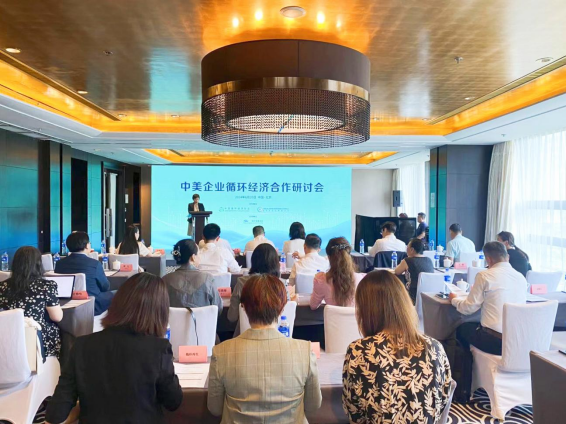
Song Changqing, Deputy Counsel (DDG-level), Department of Resource Conservation and Environmental Protection, NDRC, pointed out that China attaches great importance to the development of circular economy, after years of practice, China's circular economy has entered the fast track of sound development, and has made important contributions to coping with global climate change and promoting green low-carbon development. The development of circular economy is a global issue that requires the participation and cooperation of all countries.China has taken an active part in the multilateral and bilateral processes of circular economy, advocates its position on relevant issues in multilateral mechanisms such as the Asia-Pacific Economic Cooperation (APEC) and the World Trade Organization (WTO) and engages in bilateral cooperation with economic entities such as the European Union, the United States, and Germany. We hope that Chinese and US enterprises could enhance policy understanding, technical exchanges, and project alignment, and achieve positive and practical cooperation outcomes.
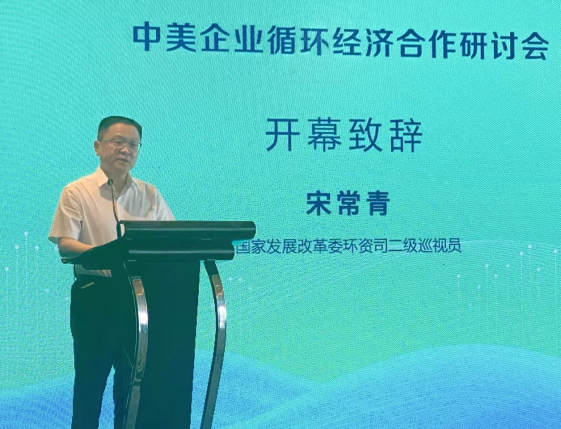
Song Changqing, Deputy Counsel (DDG-level),
Department of Resource Conservation and Environmental Protection, NDRC
Zhao Kai, Executive Vice President, CACE, said that the development of circular economy is a major strategic decision of China, and has achieved remarkable results in many aspects such as increasing resource output rate, reducing energy and water consumption, and reducing carbon emissions. China has accumulated rich practical experience in policy and legal system construction for circular economy, building circular industrial system, scientific and technological innovation, and international exchange and cooperation. He suggests that, under the guidance of the China-US "Joint Statement", Chinese and US enterprises should further deepen exchanges and cooperation in key areas of circular economy, jointly promote the international mutual recognition of relevant standards and norms, achieve win-win cooperation; conduct research on circular economy subject, promote advanced circular economy models; jointly enhance the training of professionals in circular economy and promote the improvement of their capabilities. We should actively conduct on-site visits and enhance mutual exchanges to promote circular economy cooperation between Chinese and American enterprises.
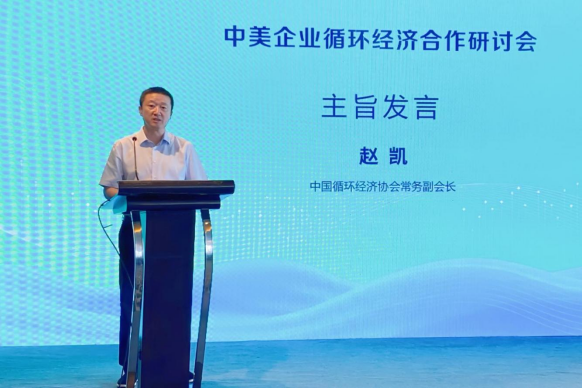
Zhao Kai, Executive Vice President, CACE
Zhang Lipei, Vice President of the US-China Business Council, said that in recent years, China and the United States have carried out a number of integrated research and project cooperation in the field of circular economy, especially in green manufacturing, resource recycling and waste recycling. We are delighted to cooperate with the China Circular Economy Association for the first time to build a platform for exchanges and cooperation in the field of circular economy between enterprises in China and the United States. And we will engage in in-depth exchanges on policies, regulations, key technological standards, and project cooperation to enhance mutual understanding and achieve win-win cooperation. Sino-US cooperation is crucial for global climate governance, which requires joint efforts from governments, business communities, and think tanks. We will continue to pay attention to the issues related to green and low-carbon development and actively build platforms for exchanges and cooperation between enterprises from China and the United States. Meanwhile, we are willing to maintain close communication with the governments, research institutions, industry organizations, and other stakeholders of both China and the United States to promote more cooperation and contribute to the fruitful outcomes of Sino-US climate cooperation, thereby making positive contributions to addressing global climate change.
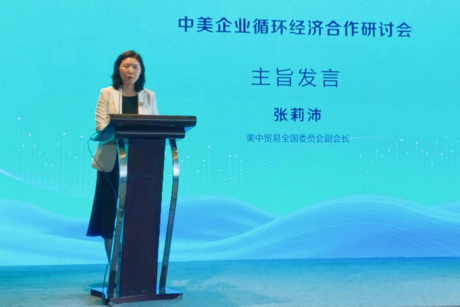
Zhang Lipei, Vice President of the US-China Business Council
Yu Jiang, Chief representative of the Paulson Institute Beijing Office, said that climate change and biodiversity loss are two major serious challenges facing the world. Accelerating the energy transition to low-carbon and promoting circular economy has become an inevitable choice for achieving sustainable development and bringing new opportunities for global economic growth. The huge Chinese market, combined with American green technology, provides a vast space for cooperation between Chinese and American enterprises.The Paulson Institute is dedicated to serving as an international think tank bridge and leader in sustainable development, and we are committed to working with all stakeholders to strengthen cooperation between China and the United States in green finance, ecological conservation, and sustainable development, and to promote market-based solutions to drive sustainable economic growth and protect critical ecosystems.
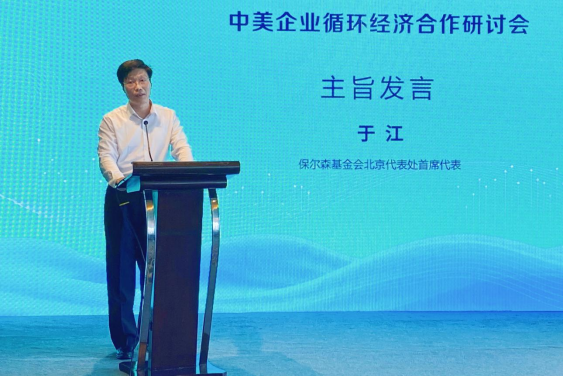
Yu Jiang, Chief representative of the Paulson Institute Beijing Office
Zhu Lei, delivered a report titled "Progress in Risk Assessment of Recycled Plastics for Food Contact Materials". She introduced the key core technologies and evaluation methods for the safety evaluation of food-contact recycled plastics, providing scientific measures and suggestions for establishing a suitable risk management model for food-contact recycled plastics in China. The preliminary investigation results show that Chinese enterprises have the ability to produce safe food-contact rPET materials.
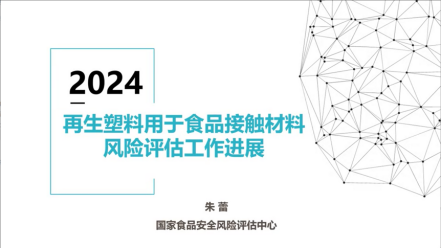
Zhou Yunfei made a report titled "The Current Status and Trends of rPET Development in China," which deeply analyzed the current market situation and development prospects of the recycled PET industry, and proposed suggestions on the trend of high-value recycling utilization solutions, including food-grade rPET, and put forward opinions and suggestions on how the recycled plastics industry in China can achieve sustainable and healthy development in the face of global challenges.
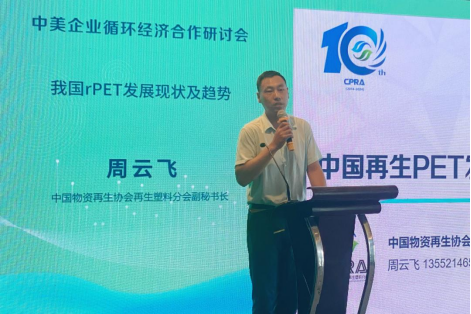
In the case sharing session on innovative solutions for plastic recycling, representatives from Dow, PepsiCo, and Yinjinda Beijing Research Institute shared their practical experiences and development strategies in establishing and improving waste recycling systems, focusing on the recycling of low-value plastic waste, food-grade rPET recycling, and the construction of new packaging material supply chains.
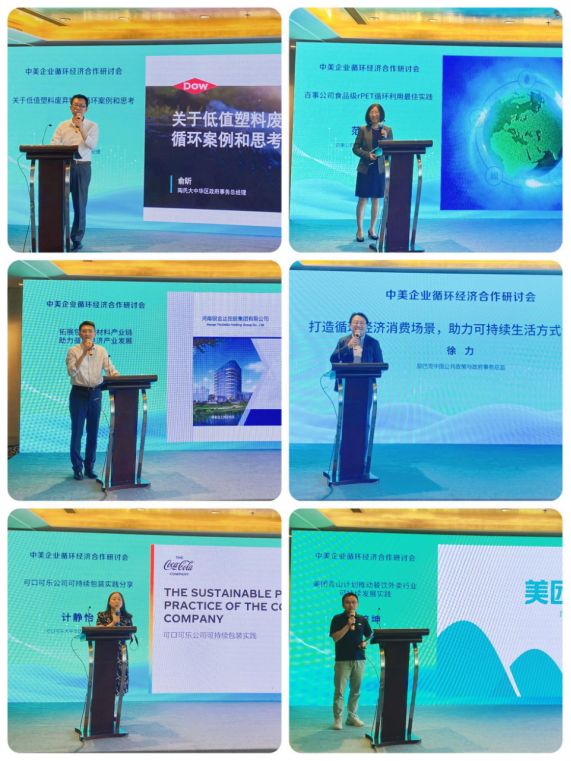
In the experience sharing session on promoting green consumption and sustainable packaging, representatives from Starbucks, Coca-Cola, and Meituan, shared their cases from different aspects, such as actively fulfilling social responsibilities, playing a leading role in the industry, creating circular economy consumption scenarios to guide consumers to form a green and low-carbon consumption concept, and technological innovation to drive sustainable packaging development.
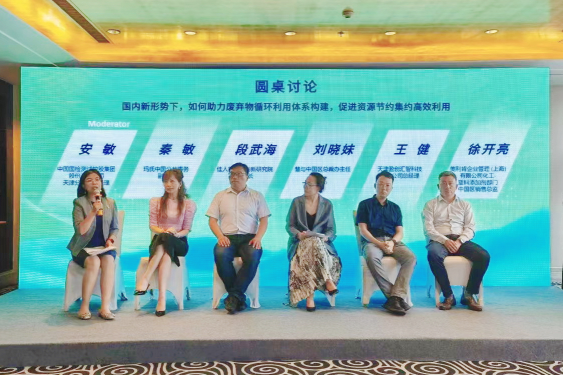
In the final roundtable discussion session, the guests exchanged in-depth views on the innovative practices and opportunities and challenges faced by enterprises in developing circular economy, assisting in the construction of a waste recycling utilization system, and promoting the efficient utilization of resources under the new situation, new tasks and new requirements of the "dual carbon" goal and the "two new" actions. Meanwhile, the guests reached consensus on jointly promoting the sustainable and healthy development of the resource recycling industry by working together with all stakeholders in the industrial chain and supply chain, establishing a standard and efficient waste recycling system, enhancing policy support and guidance, and strengthening public education at various levels.
